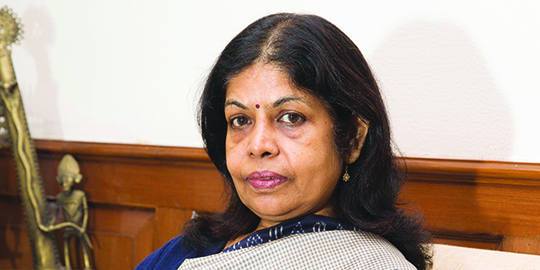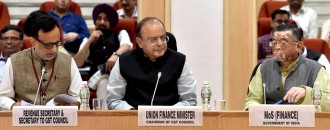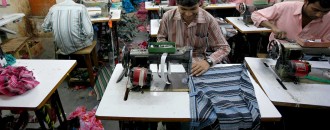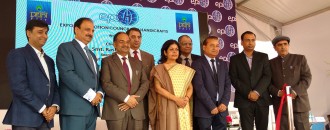
Weaving Wonders... Her Way
Rashmi Verma, who recently joined the Ministry of Textiles (Government of India), as the new Secretary, is making all the right moves to give exports from this all-important industry a leg-up.
Ahmad Shariq Khan | March 2016 Issue | The Dollar Business
Rashmi Verma, an IAS officer of 1982-batch of Bihar cadre, a postgraduate in political science and an MBA from the University of Hull (Yorkshire, England), has recently taken charge as Secretary, Ministry of Textiles, Government of India. Rashmi, who previously held the charge of Special Secretary at the Department of Revenue in Finance Ministry, feels strongly that in this new role she would be able to make a difference, which she has always strived to do since the beginning of her career. She feels the department is well placed to boost manufacturing, grow exports and generate more employment. “This industry, being the highest employment provider in the manufacturing sector, has a much bigger role and responsibility,” she says.
In a bid to set the ball rolling on many fronts, the Textiles Secretary says she has already started discussions with key stakeholders; her recent endeavours are related to countering the new challenges arising out of India’s rather lethargic efforts to innovate, diversify and move up across value chain in the textile sector.
She feels that technology issues and non-existence of FTAs with European Union, US and Canada are challenges for India's apparel exports. She points to the need for bridging the gap in the value chain so that Indian exports comprise of apparels rather than cotton and yarns.
Another area that she is actively involved in is creating a robust, efficient marketing platform for Indian manufacturers. She understands that though textile manufacturers are making some of the finest products, they have not been able to market them effectively. Also, with regards to stringent labour laws, she tells us that her office has taken up this issue with the Labour Ministry and she is hopeful that very soon there will be some good news for people working in the sector.
When asked, if as a woman, it has ever become tricky for her juggling between her two roles – one as an efficient administrator and the other of caring for her family – she said that she regards the work-family equation as a very fine balancing act which these days many women have to manage. “On work-family balancing, my motto has been: when I am in office, I am 100% in office and when at home, I am 100% for my family. So far, the approach has effectively worked for me,” she concludes.
TDB: What are some of the immediate challenges that you see engulfing the textile sector? Please tell us about your endeavours in this regard.
Rashmi Verma (RV): Since I joined, the most immediate challenge which I noticed is that although the textile sector has huge potential yet we are not able to attract new investments into this sector. Another equally big area of concern pertains to the very composition of our domestic textile sector – 80% of our textile sector is still unorganised. This large chunk includes a majority of our handloom weavers, the powerloom weavers and the handicraft artisans. The challenge is in bringing them into the mainstream and in ensuring they get proper training skills, designing inputs etc. Also, the biggest problem our manufacturers in the unorganised textile sector are facing is lack of access to credit and working capital – so we need to find ways to link them to government’s scheme such as Mudra, etc. These are the aspects that are presently in our focus.
Talking about the remaining 20% that represents our organised sector in textiles, the situation is not very encouraging there either. There are certain barriers which are stopping the sector from reaching its true potential. For example, we have an acute absence of FTAs with our existing key markets like the European Union, Australia, the United States, etc. This factor results in a competitive disadvantage to our manufacturers exporting to those markets.
Also, if you look at the value chain, you will notice we are not being able to capitalise on our capabilities. Very little value addition is being done inside the country. We are exporting yarn, cotton and fabrics but not much of apparels, which means we still have a long way to cover when it comes to exports of real value added products from the country.
TDB: Most FTAs that India has signed have not resulted in the desired outcome for Indian exporters. Your take on this.
RV: Yes, with regards to FTA, we do understand that we need to change our course of action keeping into account the changing paradigms of foreign trade for this particular sector. The current status is – India so far has signed almost 15 pacts falling in the various categories of bilateral trade treaties like free trade agreements (FTAs), preferential trade agreements (PTAs), comprehensive economic cooperation agreements (CECAs), comprehensive economic partnership agreements (CEPAs), however, they are not giving us good returns as the targeted countries are no longer our main markets, which currently are EU, US, Australia, etc. Since we do not have any trade agreements with them, our competitors like Bangladesh, Vietnam, and Sri Lanka are not only able to export at zero duty rate, (Bangladesh being in the Least Developed Countries category enjoys special privileges) but also get an edge over us due to their various trade pacts with those markets.
Besides, India is exporting at a very high duty rate – varying from 9% to 17% to these countries that naturally give many of our neighbouring countries a good advantage on final export price-points. I believe, there is a need to revamp our FTA strategy and make it focused towards our current major markets and also on emerging new markets across the globe, such as newer African markets as well as many emerging markets in Latin America.
We have already started consultations with the Ministry of Commerce on this and they are looking into the issue of how to push the India-EU FTA. I also have got a study done on the possible effects of the pact in question, on our economy, as we fully understand that any FTA is a "you win some, you lose some" proposition, so we want to make a holistic analysis of the issues and relevant factors here.
TDB: How do you see the role of Amended Technology Upgradation Fund Scheme (ATUFS) in boosting Indian manufacturing base?
RV: Recently the Cabinet has sanctioned the draft Amended Technology Upgradation Fund Scheme (ATUFS). I believe this will go a long way in offering technical support for machinery to our manufacturers. Here, I want to highlight that under the scheme, the focus will be on fabric and apparel making segments, so, in this way, we are encouraging manufacturers to do value additions within the country. This will help us move up the value chain. Prior to ATUFS, our focus has largely been on spinning, and I am glad to say that in spinning we now have self-reliance. However, the gap still exists in weaving, fabric making and in apparel making segments, so under ATUFS we are focussing on these.
TDB: According to Board of Investment of Bangladesh, of late, amid rising costs & declining sales, hundreds of Indian  garment exporters have been setting up factories in Bangladesh. What would be your message to those manufacturers?
garment exporters have been setting up factories in Bangladesh. What would be your message to those manufacturers?
RV: That is true. There has been a little bit of a reverse FDI movement from India to the neighbouring country that enjoys LDC status. Further, Bangladesh enjoys the advantage of comparative lower wages. The irony is they are importing cotton yarn from us, making apparels in their country and exporting to the world. My message to all Indian manufacturers is that we are trying to create a more conducive ecosystem for them that will facilitate their manufacturing and marketing from India at a much lower rate than what it is now. They should look at making in India.
Next Page: Keeping Her Head Up






 to success.
to success.